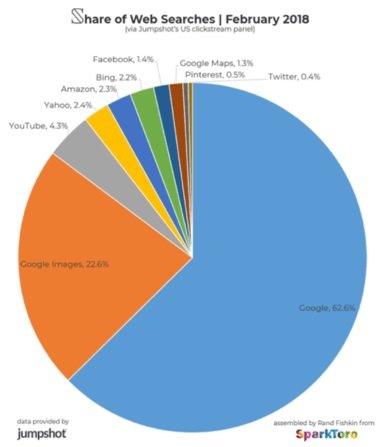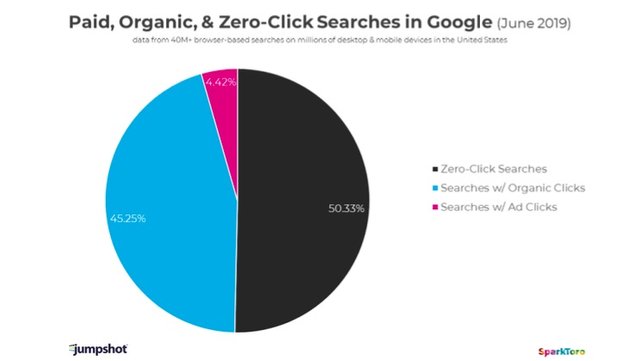
Google RIP - what is the future of internet search?
https://newsforecasters.com/?p=1778
Some 500,000 times every second we use internet search. It brings us the juiciest gossip, news, the best gifts for the holidays, history with historical data, education, our political views, logistics just to name a few, and has become the cornerstone of an economy worth trillions of dollars. Google the dominant player in internet search has turned into a verb - "just Google it." It is hard to imagine a world, real or virtual, without internet search. Google obviously will try to stay on top of this market, though considering many government entities that are looking to break them up, and that internet search technology is evolving - it will be a challenge. News Forecasters asks what is the future of internet search.
Ever since the introduction of Google Search in 1997, the worldwide market share of all search engines has been rather lopsided. Google has dominated the search engine market, maintaining an 88.47% market share as of April 2019. The primary technology used is keyword search where the search engine provides a results list textually of what the search engine believes you want to see via so-called AI (artificial intelligence). Though the AI has improved over the years, search technology in a broader sense has not changed significantly. News Forecasters sees the revenue model remains the same, the service will remain free in lieu of using the user experience to push commercial offers. What will change is the user experience and search engine results. There has been a lot of talk about the death of clicks - how to survive and thrive in a clickless world? Recent data has revealed that less than 50% of Google searches result in a click. That means over half of Google’s search engine results lead to no clicks through to websites or properties that aren’t owned by Google. Perhaps the click technology will become passé in favor of the smartphone swipe, but the idea that Google could maintain dominance in internet search and only give the results of themselves will become too hubristic. News Forecasters believes that this prediction from many industry leaders will prove wrong. Google at some point will be broken up and hence this self-indulgent strategy will become unworkable. Internet search is about advertising - this does not change.One of the problems with internet search is the Filter Bubble. A Filter Bubble is an intellectual isolation that can occur when websites make use of algorithms to selectively assume the information a user would want to see, and then give information to the user according to this assumption. It causes users to get significantly less contact with contradicting viewpoints, causing the user to become intellectually isolated.
Some of the industry predictions include advancements in voice user input and image processing. This can be placed in the wider context of "queryless search," a development that sees search engines either preempt or interpret a consumer’s intent without the need for an explicit query. In fact, Gartner thinks that by 2020, 30% of all searches will be conducted without a screen, while over 100 million consumers will shop in augmented reality by the end of this decade. Visual search is in prime position to benefit from these trends. comScore predicts that 50% of all searches will be by voice in 2020. News Forecasters believes this prediction will become true.
News Forecasters looks at internet search in two areas; the user experience and search engine results. In the area of the user experience the future may be:
- Conversation search will begin to replace the Google home page. Systems like Amazon Alexa, Apple’s Siri and Google voice make the future search engine seem more like a virtual personal assistant.
- Natural language processing will also become more prevalent. Today, the search engine takes a set of keywords as the input. Instead, a new search framework will have questions as the input and answers as the output.
- Queryless search which will predict what search you may like to do.
- Drill-down search guidance - with leveling parameters. As the user is using natural language processing, the user will be guided on a drill-down basis toward their desired result.
- Recommendation engine improvements to provide suggested search criterion and results via AI.
- User configurability - that allows users to tailor their own personal user experience.
- Content integration to provide a more seamless content to advertising messaging.
- Contextual inclusion such as location, face recognition, environment, social media relationships, and localized sensors - just to name a few (private and public).
- Visualization of results that will facilitate drill-down search results - perhaps something like a bubble display as opposed to simple text lists. A little more difficult with audio, but perhaps a new internet language could arrive to facilitate this technology.
- System decoupling - where both front and backend search components will decouple, with even further fracturing of search delivery components - interface standards may come about to facilitate this approach. Government regulation may force an open platform strategy, similar to the decoupling of old long-distance and local telecom companies.
- SEO adaptations will need to be considered to adapt to a new internet search platform technologies. Perhaps even standards.
- User configurability - that allows users to tailor their own search results. This includes not only results obtained but even set user profiles to change one's preferences within the user's context.
It has been decades since we have seen "significant" changes in internet search. This is about to change due to technology advances, government regulation and dominate player market neglect. News Forecasters believes this will be positive for the internet.
A video presentation of this subject:

